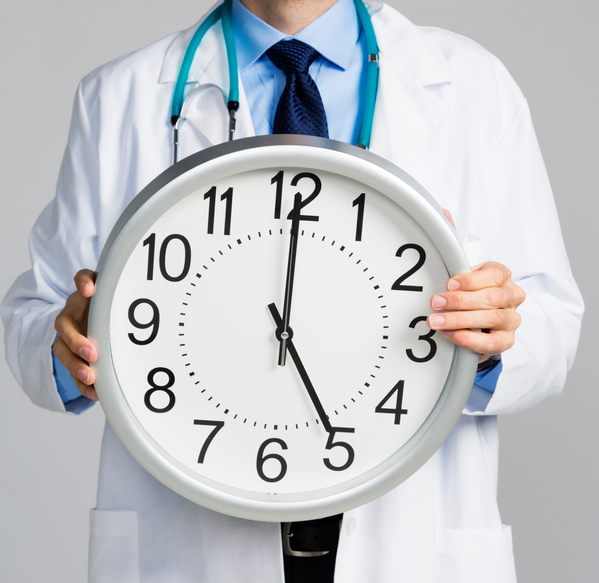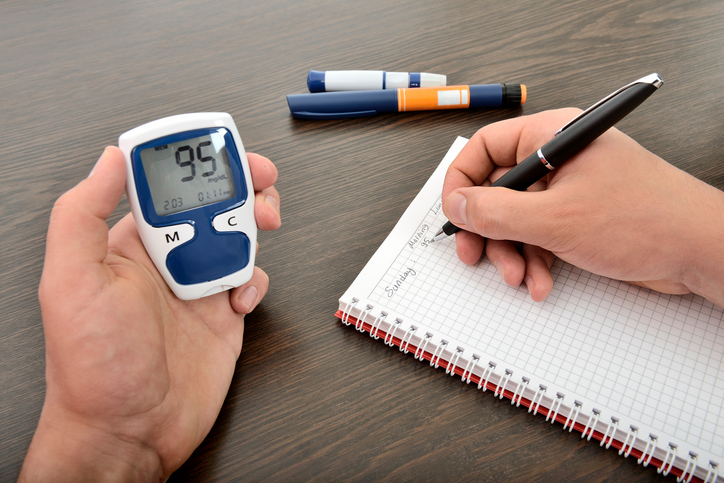
Have you ever left a doctor’s appointment feeling the visit was not a resounding success? Maybe you felt you spent too much time in the waiting (and waiting… and waiting…) room? Or maybe you had a question that never got answered? Or you felt rushed? Or you did not get part of you checked that you thought should have been? If this rings a bell, then you have come to the right place, because here (with apologies to David Letterman) I present my top ten tips to make your next family doctor or diabetes specialist appointment a success.
Number 10

Think of your doctor as being your guidance counselor, not your school principal. Your doctor gives advice; that is all. You can choose to accept this advice or you can choose to reject it. (But, of course, if you are rejecting your doctor’s advice because you do not trust it, you need to ask yourself if it is time to change doctors.) Your doctor is not there to judge you; and in particular is not there to judge your blood glucose readings or A1C. Therefore, be candid with your doctor. Share your blood glucose levels with him or her (all your readings; not just the ones that are in target!), let your physician know if you have stopped taking one of your medications or are missing doses, tell your doctor if you have missed appointments with your eye specialist or diabetes educator, and so on. Being honest, candid and forthright with your physician will serve you and your diabetes immensely better than holding back important information.
Number 9

Imagine, if you will, that you have your entire life’s savings invested in the stock market. Every hard-earned dollar. Now imagine you call your broker and ask how your investments are doing. What would you think if your broker said to you, “They’re fine” and then hung up? Does “fine” mean you are making lots of money? Or does “fine” mean you are having an average rate of return? Or does it mean you have lost some money, but from your broker’s perspective it could have been worse? Who knows? I sure wouldn’t. So when your doctor checks your blood pressure or your kidney urine test or your A1C, do not accept being told the result is “fine” or “good” or “okay” or some such other, vague thing. Make sure you find out the exact result. Ask if the result is above target. If it is, ask how you can work with your doctor to improve it. Your doctor will not be offended. Quite the opposite. In fact, your doctor will be thrilled to have such a keen partner with which to work toward attaining a common goal—keeping you healthy!
Number 8

If you have had a lab test and you do not subsequently receive a call from your doctor’s office, do not for one moment conclude that “no news is good news.” Maybe no news means that the result got lost in the mail, got accidentally thrown out, or went to the wrong doctor. (Just ask my wife, who is a physician and shares the name of three other doctors in Toronto; she regularly has their patients’ results mistakenly sent to her!). I would suggest that when you see your doctor, you ask how you will find out your results. Can you look them up on the internet? Can you have the lab or the office send you a copy of the results? Should you call the office to get them? Should you book a follow-up appointment to review them? (Heck, it’s your body fluid after all!)
Number 7

If you are being prescribed a drug, be sure to ask your doctor some crucial things about the medicine. For example, why is it being prescribed, how will it help you, what possible side effects can be expected, and what should be done if side effects occur?
Number 6

Tired of waiting until you become covered in cobwebs in the “waiting room?” Try booking your appointment for the first slot of the day or the first slot in the afternoon. Dollars to donuts, your wait will be a lot less.
Number 5

Need more time with your doctor than you are getting? Feeling constantly rushed during appointments? Next time, when you book your appointment, ask the doctor’s secretary to book you in for a longer time slot. If that does not work, ask for the last slot of the day. Most likely, if you are the last patient the doctor has to see that day, he or she will not feel as rushed (which means more time for you).
Number 4

Want to get preferred appointment times? Longer appointment times? Want to get squeezed into an already-full schedule? Then remember, the doctor’s secretary is a VIP! So be sure to be extra nice. Nice helps. Trust me. Better yet, trust my secretary!
Number 3

Your doctor should be checking your feet regularly, but this important part of one’s anatomy often gets overlooked at the time of routine appointments. Not any more! Because now as soon as you go into your doctor’s examining room, you are going to take off your shoes and socks and present your beautiful (or not so beautiful as the case may be) tootsies to your doc for an examination. If you have no issues with your feet, a yearly exam is perfectly fine.
Number 2

Almost everyone with diabetes, especially if you are using insulin, should be testing their blood glucose levels or using a continuous glucose monitoring (CGM) system. Nearly all blood glucose meters can be downloaded or have the data transmitted wirelessly to a smartphone, but, unfortunately, the way in which the data is displayed is typically not nearly as helpful as it could – and should –be. As a result, analyzing the data can be far too difficult and as a result, important changes to a person’s blood glucose-lowering medication don’t always get made. The best layout for blood glucose readings is in a spreadsheet format. Have a look at my website (www.ourdiabetes.com) for an example of what I find to be the best way of displaying the information. If you have one of the few meters that can display readings in this format, that’s great. Just show the readings on your meter (or smartphone) to your physician during your appointment. If, however, you don’t have such a meter then be sure to write the past few weeks readings down in spreadsheet format before your appointment. Even better, keep a log of your readings all the time so that you can analyze the numbers yourself! (One other thing to bear in mind; if you are taking insulin then you should also record your doses so that your provider can match your blood glucose readings to your insulin doses. This will let your physician know if your insulin type, timing, or doses need changing). If you are using a continuous glucose monitoring system, make sure your data is available (either on your device or in the cloud) at the time of your visit to your doctor. If your continuous glucose monitor requires you to log on to a Website to review the data make sure you bring your log on information (including your password) to your appointment!
Number 1
Now, as much as I hope that you have found the preceding nine tips helpful, I have saved the absolutely, positively, most important tip for last. Forget about waiting-room lineups, log books, guidance counselors, and secretary VIPs. No, when it comes to the truly essential, number-one tip for making your doctor’s appointment a success it is this: Whatever you do, never honk or yell (or worse) at the guy that cut you off in the doctor’s parking lot; he could be the guy wearing the rubber glove that you will be seeing in 5 minutes!



Good presentation. Great information. Thank you!
Thanks Carre! Hope it helps!
THANK YOU FOR THE TEN TOP TIPS. THEY ARE THOUGHTFUL AND COMPREHENSIVE. KEEP ON MOTIVATING US.
Some of these points you have mentioned in the blog seem so relevant in my point of view. For instance, one of the greatest challenges doctors face is when the patients assume things based on what is told to them. This can actually harm the reputation of doctors for no fault of theirs. Great share and motivational.
I like your suggestion to ask for the last appointment slot of the day so the doctor will feel less rushed. My husband and I recently moved to a new area, and I want the visits to our new doctor to go as well as possible. I don’t like feeling rushed, so I’ll take your advice and ask for the last slot of the day!
I have an appointment to take my kids to the doctor next week and that’s always quite the process. Before reading this article, I do not think I have ever heard of doctors checking your feet. I can see why this would get overlooked, one of my kids are diabetic so I know how important foot care is.
That’s a good point that your doctor doesn’t really check your feet out unless you ask them to. I would want to make sure that my feet are in good condition since I use them all the time. I’ll have to start making sure they get checked too when I go to the doctor.
I like how the article explains that if you don’t want to wait as long at a doctors appointment, you can try to book the first slot of the day so you don’t have to wait to be helped. I never like to wait in the waiting room as I feel uncomfortable. Maybe I will look into getting the first slot of the day next time.
Hope it helps, Mia!
Can’t believe what the medical system has come to speed doctoring I’m shocked since I don’t go to drs unless it’s something urgent the changes from long ago to now are shocking prices are way up and service is way down I don’t like rolling the dice on proper or the right care after all it is our life we are risking with possible wrong care how can this be justified?
So someone dies because dr in hurry miss important signs oh well next! This is crazy who can you trust? It’s all about the mighty dollar bet the drs family gets great care no problem getting meds guess should have gone to medical school physician heal thy self !!!!!
I am seeing you tomorrow, so I will use these helpful tips. I love the humour and more importantly the explanations on why these tips are so important.
I enjoyed the read. Thank you
Thanks Christine!
The moment that particularly struck me was when my UACR levels were high, but this issue didn’t receive adequate attention during one of those hurried appointments. Despite multiple months of experiencing proteinuria, my concerns were only met with standard lifestyle recommendations when raised. However, after engaging with your TCOYD discussions and discovering SGLT2 inhibitors, I realized the importance of consulting an endocrinologist well-versed in modern medical therapies. I’ve arranged my initial appointment for February 6th and am genuinely excited about taking this step forward. Your educational discussions have been immensely valuable, and I’m grateful for the knowledge shared.
Wow, that’s so nice to hear. Really appreciate you taking the time to comment, and glad you’re going to see an endo soon. Take good care and stay well!